自考汉语言本科:00015英语二讲义Unit 8 The Great Minds0805
- 格式:doc
- 大小:35.00 KB
- 文档页数:9
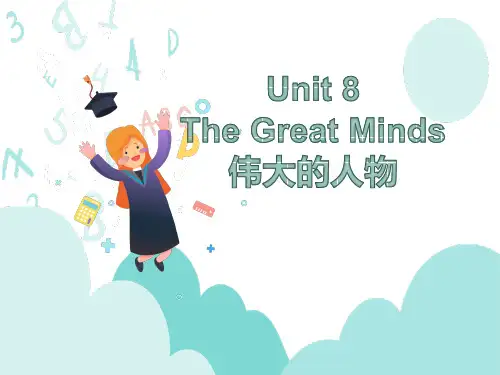
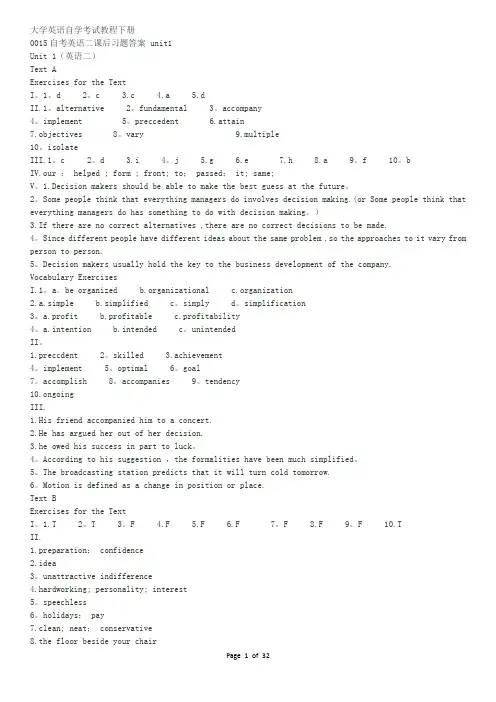
大学英语自学考试教程下册0015自考英语二课后习题答案 unit1Unit 1(英语二)Text AExercises for the TextI。
1。
d 2。
c 3.c 4.a 5.dII.1。
alternative 2。
fundamental 3。
accompany4。
implement 5。
preccedent 6.attain7.objectives 8。
vary 9.multiple10。
isolateIII.1。
c 2。
d 3.i 4。
j 5.g 6.e 7.h 8.a 9。
f 10。
bIV.our ; helped ; form ; front; to; passed; it; same;V。
1.Decision makers should be able to make the best guess at the future。
2。
Some people think that everything managers do involves decision making.(or Some people think that everything managers do has something to do with decision making。
)3.If there are no correct alternatives ,there are no correct decisions to be made.4。
Since different people have different ideas about the same problem ,so the approaches to it vary from person to person.5。
Decision makers usually hold the key to the business development of the company.Vocabulary ExercisesI.1。
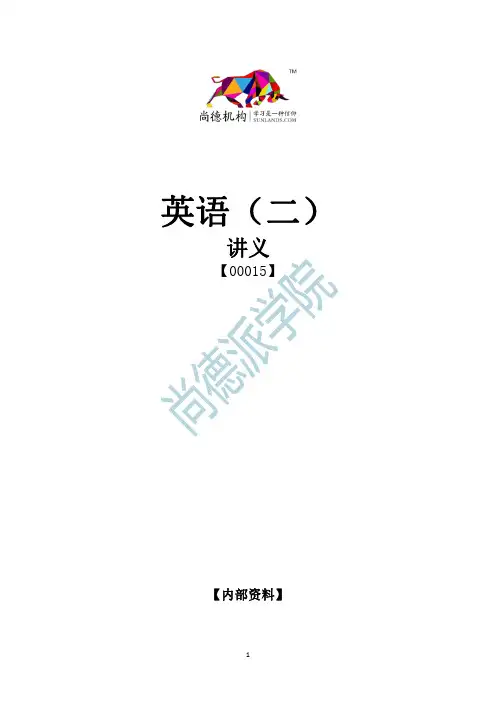
英语(二)讲义【00015】【内部资料】课程介绍一、课程性质英语(二)是高等教育自学考试各专业(英语专业除外)本科阶段的公共基础课。
目录第一部分语法知识 (4)第一单元名词形容词副词介词 (4)第一章名词 (4)第二章形容词 (5)第三章副词 (8)第四章介词 (10)第二单元谓语动词 (11)第一章系动词 (12)第二章情态动词 (12)第三章时态 (13)第四章英语语态 (16)第三单元非谓语动词 (17)第一章动词不定式 (18)第二章分词 (19)第四单元从句 (21)第一章名词性从句 (21)第二章形容词从句(定语从句) (21)第三章副词从句(状语从句) (21)第五单元并列结构 (22)第二部分应对技巧 (24)第一章阅读判断 (24)第二章阅读选择 (28)第三章概括段落大意和补全句子 (33)第四章填句补文 (36)第五章填词补文 (38)第六章完形补文 (40)第七章短文写作 (41)第一部分语法知识第一单元名词形容词副词介词第一章名词一、概念名词表示人、事物、地点或抽象概念的名称。
如:person,phone,China,time二、用法1.名词作主语和宾语。
●Knowledge is power.(知识就是力量。
)●I love English.(我喜欢英语。
)2.名词可以作定语修饰名词①作定语的名词往往是说明其中名词的材料、用途、时间、地点、内容、类别等②被修饰的名词变复数时,一般情况下,作定语用的名词不需要变为复数形式。
●a diamond ring(一枚钻戒)●orange juice(橙汁)●English lessons(英语课)3.名词分为可数名词和不可数名词,可数名词出现时,要么是复数名词,要么前面加限定词,如冠词(a、an或the),不可数名词永远是单数形式。
●He has a girlfriend.(他有一个女朋友。
)●He has two girlfriends.(他有两个女朋友。
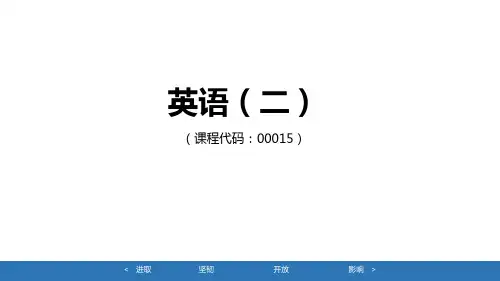
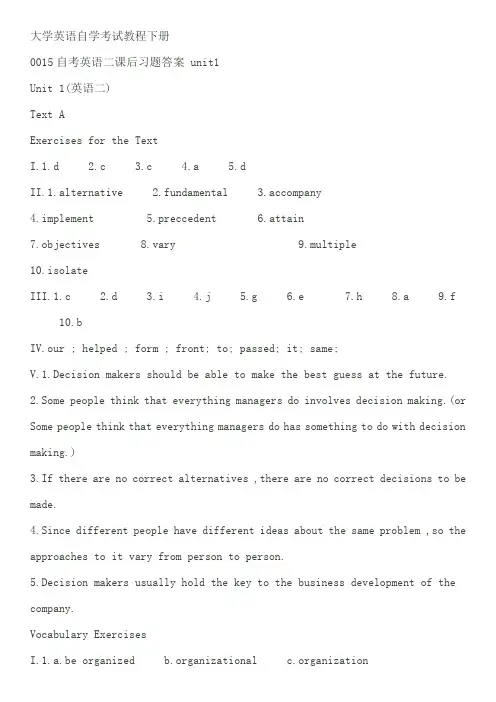
大学英语自学考试教程下册0015自考英语二课后习题答案 unit1Unit 1(英语二)Text AExercises for the TextI.1.d 2.c 3.c 4.a 5.dII.1.alternative 2.fundamental 3.accompany4.implement5.preccedent6.attain7.objectives 8.vary 9.multiple10.isolateIII.1.c 2.d 3.i 4.j 5.g 6.e 7.h 8.a 9.f 10.bIV.our ; helped ; form ; front; to; passed; it; same;V.1.Decision makers should be able to make the best guess at the future. 2.Some people think that everything managers do involves decision making.(or Some people think that everything managers do has something to do with decision making.)3.If there are no correct alternatives ,there are no correct decisions to be made.4.Since different people have different ideas about the same problem ,so the approaches to it vary from person to person.5.Decision makers usually hold the key to the business development of the company.Vocabulary ExercisesI.1.a.be organized anizational anization3.a.profit b.profitable c.profitability4.a.intention b.intended c.unintendedII.1.preccdent2.skilled3.achievement4.implement5.optimal6.goal7.accomplish 8.accompanies 9.tendency10.ongoingIII.1.His friend accompanied him to a concert.2.He has argued her out of her decision.3.he owed his success in part to luck.4.According to his suggestion ,the formalities have been much simplified.5.The broadcasting station predicts that it will turn cold tomorrow.6.Motion is defined as a change in position or place.Text BExercises for the TextI.1.T 2.T 3.F 4.F 5.F 6.F 7.F 8.F 9.F 10.TII.1.preparation; confidence2.idea3.unattractive indifference4.hardworking; personality; interest5.speechless6.holidays; pay8.the floor beside your chair9.politely; naturally10."I beg your pardon?" or "Could you please repeat it?" etc. Vocabulary ExercisesI.1.at a disadvantage2.conservative3.indifference4.make sure5.vague6.clutched7.turned down 8.to your advantage 9.neat10.prospects 11.take the trouble to 12.placeGrammar ExercisesI.1.连词;让步状语从句。
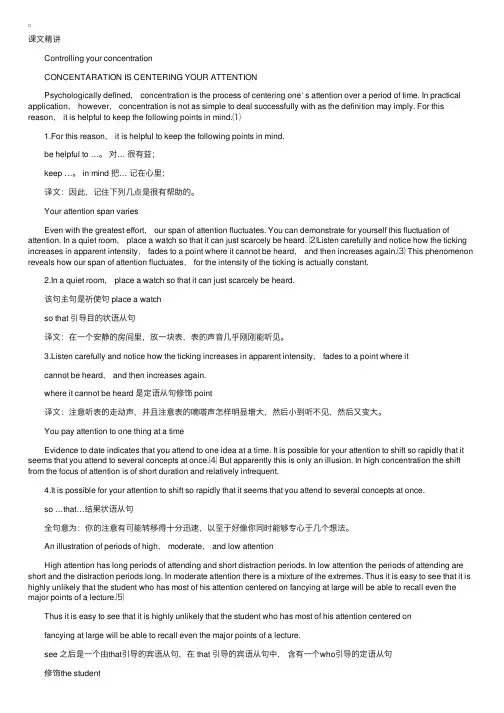
课⽂精讲 Controlling your concentration CONCENTARATION IS CENTERING YOUR ATTENTION Psychologically defined, concentration is the process of centering one‘ s attention over a period of time. In practical application, however, concentration is not as simple to deal successfully with as the definition may imply. For this reason, it is helpful to keep the following points in mind.⑴ 1.For this reason, it is helpful to keep the following points in mind. be helpful to …。
对… 很有益; keep …。
in mind 把… 记在⼼⾥; 译⽂:因此,记住下列⼏点是很有帮助的。
Your attention span varies Even with the greatest effort, our span of attention fluctuates. You can demonstrate for yourself this fluctuation of attention. In a quiet room, place a watch so that it can just scarcely be heard. ⑵Listen carefully and notice how the ticking increases in apparent intensity, fades to a point where it cannot be heard, and then increases again.⑶ This phenomenon reveals how our span of attention fluctuates, for the intensity of the ticking is actually constant. 2.In a quiet room, place a watch so that it can just scarcely be heard. 该句主句是祈使句 place a watch so that 引导⽬的状语从句 译⽂:在⼀个安静的房间⾥,放⼀块表,表的声⾳⼏乎刚刚能听见。
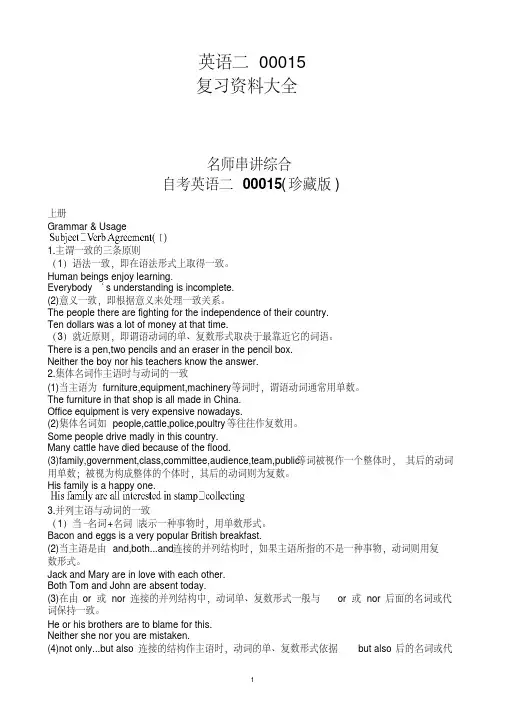
英语二00015复习资料大全名师串讲综合自考英语二00015(珍藏版)上册Grammar & UsageⅠ)1.主谓一致的三条原则(1)语法一致,即在语法形式上取得一致。
Human beings enjoy learning.Everybody‘s understanding is incomplete.(2)意义一致,即根据意义来处理一致关系。
The people there are fighting for the independence of their country.Ten dollars was a lot of money at that time.(3)就近原则,即谓语动词的单、复数形式取决于最靠近它的词语。
There is a pen,two pencils and an eraser in the pencil box.Neither the boy nor his teachers know the answer.2.集体名词作主语时与动词的一致(1)当主语为furniture,equipment,machinery等词时,谓语动词通常用单数。
The furniture in that shop is all made in China.Office equipment is very expensive nowadays.(2)集体名词如people,cattle,police,poultry等往往作复数用。
Some people drive madly in this country.Many cattle have died because of the flood.(3)family,government,class,committee,audience,team,public等词被视作一个整体时,其后的动词用单数;被视为构成整体的个体时,其后的动词则为复数。
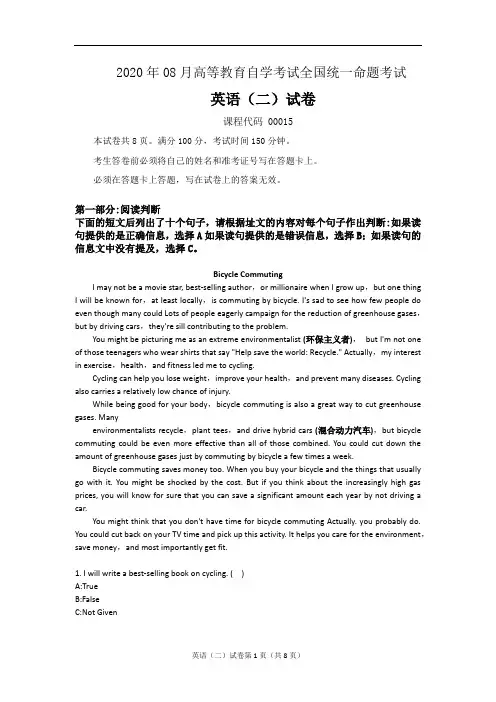
2020年08月高等教育自学考试全国统一命题考试英语(二)试卷课程代码 00015本试卷共8页。
满分100分,考试时间150分钟。
考生答卷前必须将自己的姓名和准考证号写在答题卡上。
必须在答题卡上答题,写在试卷上的答案无效。
第一部分:阅读判断下面的短文后列出了十个句子,请根据址文的内容对每个句子作出判断:如果读句提供的是正确信息,选择A如果读句提供的是错误信息,选择B;如果读句的信息文中没有提及,选择C。
Bicycle CommutingI may not be a movie star, best-selling author,or millionaire when I grow up,but one thing I will be known for,at least locally,is commuting by bicycle. I's sad to see how few people do even though many could Lots of people eagerly campaign for the reduction of greenhouse gases,but by driving cars,they're sill contributing to the problem.You might be picturing me as an extreme environmentalist (环保主义者),but I'm not one of those teenagers who wear shirts that say "Help save the world: Recycle." Actually,my interest in exercise,health,and fitness led me to cycling.Cycling can help you lose weight,improve your health,and prevent many diseases. Cycling also carries a relatively low chance of injury.While being good for your body,bicycle commuting is also a great way to cut greenhouse gases. Manyenvironmentalists recycle,plant tees,and drive hybrid cars (混合动力汽车),but bicycle commuting could be even more effective than all of those combined. You could cut down the amount of greenhouse gases just by commuting by bicycle a few times a week.Bicycle commuting saves money too. When you buy your bicycle and the things that usually go with it. You might be shocked by the cost. But if you think about the increasingly high gas prices, you will know for sure that you can save a significant amount each year by not driving a car.You might think that you don't have time for bicycle commuting Actually. you probably do. You could cut back on your TV time and pick up this activity. It helps you care for the environment,save money,and most importantly get fit.1. I will write a best-selling book on cycling. ( )A:TrueB:FalseC:Not Given英语(二)试卷第1页(共8页)。
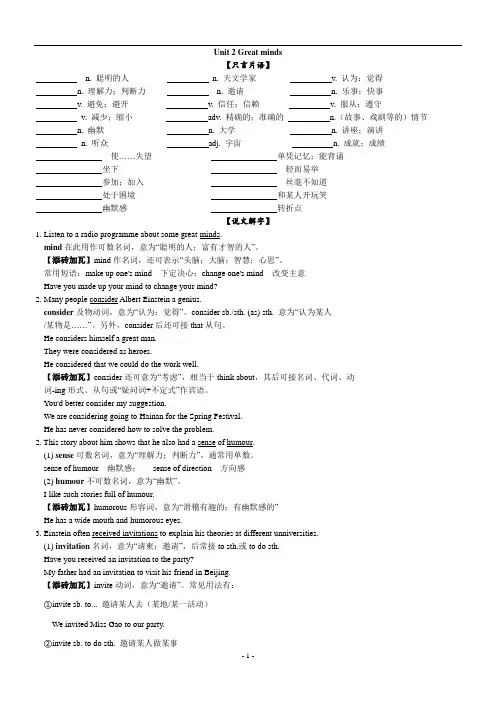
Unit 2 Great minds【只言片语】n. 聪明的人n. 天文学家v. 认为;觉得n. 理解力;判断力n. 邀请n. 乐事;快事v. 避免;避开v. 信任;信赖v. 服从;遵守v. 减少;缩小adv. 精确的;准确的n.(故事、戏剧等的)情节n. 幽默n. 大学n. 讲座;演讲n. 听众adj. 宇宙n. 成就;成绩使……失望单凭记忆;能背诵坐下轻而易举参加;加入丝毫不知道处于困境和某人开玩笑幽默感转折点【说文解字】1. Listen to a radio programme about some great minds.mind在此用作可数名词,意为“聪明的人;富有才智的人”。
【添砖加瓦】mind作名词,还可表示“头脑;大脑;智慧;心思”。
常用短语:make up one's mind 下定决心;change one's mind 改变主意Have you made up your mind to change your mind?2. Many people consider Albert Einstein a genius.consider及物动词,意为“认为;觉得”。
consider sb./sth. (as) sth. 意为“认为某人/某物是……”。
另外,consider后还可接that从句。
He considers himself a great man.They were considered as heroes.He considered that we could do the work well.【添砖加瓦】consider还可意为“考虑”,相当于think about,其后可接名词、代词、动词-ing形式、从句或“疑问词+不定式”作宾语。
You'd better consider my suggestion.We are considering going to Hainan for the Spring Festival.He has never considered how to solve the problem.2. This story about him shows that he also had a sense of humour.(1) sense可数名词,意为“理解力;判断力”,通常用单数。
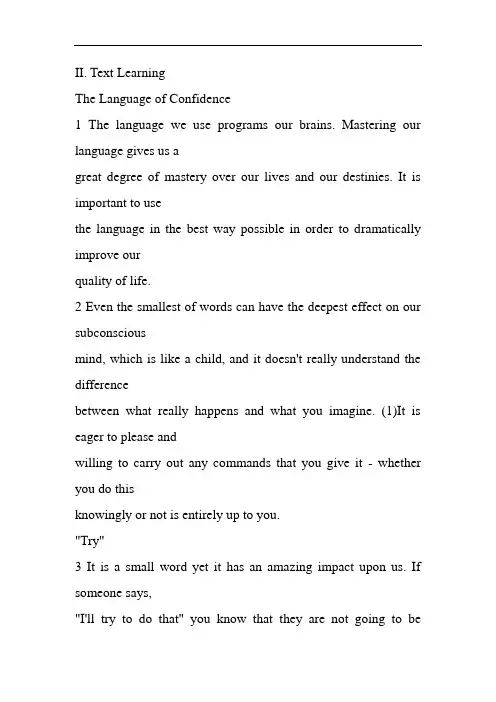
II. Text LearningThe Language of Confidence1 The language we use programs our brains. Mastering our language gives us agreat degree of mastery over our lives and our destinies. It is important to usethe language in the best way possible in order to dramatically improve ourquality of life.2 Even the smallest of words can have the deepest effect on our subconsciousmind, which is like a child, and it doesn't really understand the differencebetween what really happens and what you imagine. (1)It is eager to please andwilling to carry out any commands that you give it - whether you do thisknowingly or not is entirely up to you."Try"3 It is a small word yet it has an amazing impact upon us. If someone says,"I'll try to do that" you know that they are not going to beputting their wholeheart into it, and may not even do it at all. (2)How often do you use the wordtry when talking about the things that matter to you? Do you say "I'll try to bemore confident" or "I'll try to do that" or "I'll try to call"?4 Think about something that you would like to achieve, and say it to yourselfin two different ways. Firstly say, "I'll try to …" and notice how you feel.Next say, "I will do …" and see how you feel.5 (3)The latter makes you feel better than the first one, doesn't it? It givesyou a sense of determination, a feeling that it will be done. Listen to thepeople around you and when they say they will try notice if it gets done or not.Eliminate the word try from your dictionary and see how your life improves.(承上句)本部分重点及难点:显示重难点解析1. It is eager to please and willing to carry out any commandsthat you give it- whether you do this knowingly or not is entirely up to you.它渴望取悦,乐意听从你给它的任何命令,而你是有意还是无意地做这些完全取决于你。

英语(二)讲义【00015】【内部资料】课程介绍一、课程性质英语(二)是高等教育自学考试各专业(英语专业除外)本科阶段的公共基础课。
目录第一部分语法知识 (4)第一单元名词形容词副词介词 (4)第一章名词 (4)第二章形容词 (5)第三章副词 (8)第四章介词 (10)第二单元谓语动词 (11)第一章系动词 (12)第二章情态动词 (12)第三章时态 (13)第四章英语语态 (16)第三单元非谓语动词 (17)第一章动词不定式 (18)第二章分词 (19)第四单元从句 (21)第一章名词性从句 (21)第二章形容词从句(定语从句) (21)第三章副词从句(状语从句) (21)第五单元并列结构 (22)第二部分应对技巧 (24)第一章阅读判断 (24)第二章阅读选择 (28)第三章概括段落大意和补全句子 (33)第四章填句补文 (36)第五章填词补文 (38)第六章完形补文 (40)第七章短文写作 (41)第一部分语法知识第一单元名词形容词副词介词第一章名词一、概念名词表示人、事物、地点或抽象概念的名称。
如:person,phone,China,time二、用法1.名词作主语和宾语。
●Knowledge is power.(知识就是力量。
)●I love English.(我喜欢英语。
)2.名词可以作定语修饰名词①作定语的名词往往是说明其中名词的材料、用途、时间、地点、内容、类别等②被修饰的名词变复数时,一般情况下,作定语用的名词不需要变为复数形式。
●a diamond ring(一枚钻戒)●orange juice(橙汁)●English lessons(英语课)3.名词分为可数名词和不可数名词,可数名词出现时,要么是复数名词,要么前面加限定词,如冠词(a、an或the),不可数名词永远是单数形式。
●He has a girlfriend.(他有一个女朋友。
)●He has two girlfriends.(他有两个女朋友。
Unit 1 The Power of LanguageText A读前问题:1.通常情况下,你是否会反对作者提出的观点?你认为什么是积极阅读?2.你希望作者就批判性阅读提出什么样的建议呢?批判性阅读批判性阅读适用于非小说类文学写作,作者要么提出观点,要么陈述事实。
批判性阅读就是积极阅读,不仅仅要解决作者所说的话,还要对其提出质疑,进行评价,进而形成自己的独特的观点。
要想成为批判性读者,就要做到以下几点:考虑写作的语境。
你所阅读的文章,其作者的文化背景也许与你截然不同,抑或文章是以前写的,与你所处的时代也完全不同。
无论哪种情况,你都必须意识到你的价值观和态度与作者所述的价值观和态度是不同的,要充分考虑这些差异。
质疑作者提出的观点。
不要按照字面意思来理解文章的内容,在此之前,一定要搞清楚作者是否提供了足够的证据,证明他的观点是正确的。
查找事实、例证和统计数据,还要看看作者是否结合了各学术权威的著作。
对比该文章与相关话题的其他文章。
看一下文章是否与别人写的相关话题的文章一致,如果有不一致之处,就要仔细评价作者所提供的证据。
分析作者的假设。
假设就是作者为了提出观点而认为正确的东西。
在很多情况下,作者的假设都不是直接表述出来的,这就是说你必须认真阅读才能找到假设。
一旦找到了假设,就必须确定是否合理。
评价作者利用的资料。
在评价时,一定要确认资料来源是可靠的。
例如,要想写物理学上取得的里程碑式的成就,那么爱因斯坦就是可靠的资料来源。
此外,还要保证资料的相关性,有关诗歌的话题与爱因斯坦就不相关了。
最后,如果作者写的是当今的话题,那就必须用当今的资料。
例如,如果作者讨论的是目前物理方面的知识,那么就不适合引用爱因斯坦在20世纪早期所做的研究了。
发现作者可能持有的偏见。
有关美国政治的书面论述可能因作者是共和党或民主党迥然而异。
文章内容可能会反映作者的偏见,因此在阅读作者的文章时就要考虑到这种可能存在的偏见,这就是所谓的“质疑一切”。
2020年8月高等教育自学考试全国统一命题考试英语(二) 试卷课程代码00015本试卷共8页。
满分100分,考试时间150分钟。
考生答卷前必须将自己的姓名和准考证号写在答题卡上。
必须在答题卡上答题,写在试卷上的答案无效。
第一部分:阅读判断(第1-10题,每题1分,共10分)下面的短文后列出了10个句子,请根据短文的内容对每个句子作出判断;如果该句提供的是正确信息,选择A;如果该句提供的是错误信息,选择B;如果该句的信息文中没有提及,选择C。
BicycleCommutingI may notbe a movie star, best selling author, or millionaire when I grow up,butone thing I will be known for,at least locally,is commuting by bicycle. I's sad to see how few people do eventhough many could Lots of people eagerly campaign for the reduction ofgreenhouse gases, but by driving cars,they're sillcontributing to the problem.You might be picturing me as an extremeenvironmentalist (环保主义者),but I'm not oneof those teenagers who wear shirts that say "Help save the world:Recycle." Actually, my interest in exercise, health, and fitness led me tocycling.Cycling can help you lose weight, improve yourhealth, and prevent many diseases. Cycling also carries a relatively low chanceof injury.While being good for your body, bicyclecommuting is also a great way to cut greenhouse gases. Many environmentalistsrecycle,plant tees, and drive hybrid cars (混合动力汽车),but bicycle commuting could be even more effective than all of thosecombined. You could cut down the amount of greenhouse gases just by commutingby bicycle a few times a week.Bicycle commuting saves money too. When youbuy your bicycle and the things that usually go with it. You might be shockedby the cost. But if you think about the increasingly high gas prices, you willknow for sure that you can save a significant amount each year by not driving acar.You might think that you don't have time forbicycle commuting Actually. you probably do.You could cut back on your TV timeand pick up this activity, It helps you care for the environment, save money,andmost importantly get fit.1. I will write a best-selling book on cycling.( )A: True B: False C: NotGiven2. Many local people commute bybicycle. ( )A: True B: False C: NotGiven3. I am devoted to environmentalprotection. ( )A: True B: False C: Not Given4. I started cycling to improve myhealth. ( )A: True B: False C: NotGiven5. People are less likely to getinjured while cycling. ( )A: True B: False C: NotGiven6. People drive to work forconvenience. ( )A: True B: False C: NotGiven7. Bicycle commuting could be moreeffective in reducing greenhouse gases. ( )A: True B: False C: NotGiven8. People are in a good mood whilecycling. ( )A: True B: False C: NotGiven9. Gas prices keep going up. ( )A: True B: False C: NotGiven10. Bikesare inexpensive to most people. ( )A: True B: False C: NotGiven第二部分:阅读选择(第11-15题,每题2分,共10分)阅读下面短文,请从短文后所给各题的4个选项(A、B、C、D)中选出1个最佳选项,并在答题卡相应位置上将该项涂黑。
2020年08月高等教育自学考试全国统一命题考试英语(二)试卷课程代码 00015本试卷共8页。
满分100分,考试时间150分钟。
考生答卷前必须将自己的姓名和准考证号写在答题卡上。
必须在答题卡上答题,写在试卷上的答案无效。
第一部分:阅读判断下面的短文后列出了十个句子,请根据址文的内容对每个句子作出判断:如果读句提供的是正确信息,选择A如果读句提供的是错误信息,选择B;如果读句的信息文中没有提及,选择C。
Bicycle CommutingI may not be a movie star, best-selling author,or millionaire when I grow up,but one thing I will be known for,at least locally,is commuting by bicycle. I's sad to see how few people do even though many could Lots of people eagerly campaign for the reduction of greenhouse gases,but by driving cars,they're sill contributing to the problem.You might be picturing me as an extreme environmentalist (环保主义者),but I'm not one of those teenagers who wear shirts that say "Help save the world: Recycle." Actually,my interest in exercise,health,and fitness led me to cycling.Cycling can help you lose weight,improve your health,and prevent many diseases. Cycling also carries a relatively low chance of injury.While being good for your body,bicycle commuting is also a great way to cut greenhouse gases. Manyenvironmentalists recycle,plant tees,and drive hybrid cars (混合动力汽车),but bicycle commuting could be even more effective than all of those combined. You could cut down the amount of greenhouse gases just by commuting by bicycle a few times a week.Bicycle commuting saves money too. When you buy your bicycle and the things that usually go with it. You might be shocked by the cost. But if you think about the increasingly high gas prices, you will know for sure that you can save a significant amount each year by not driving a car.You might think that you don't have time for bicycle commuting Actually. you probably do. You could cut back on your TV time and pick up this activity. It helps you care for the environment,save money,and most importantly get fit.1. I will write a best-selling book on cycling. ( )A:TrueB:FalseC:Not Given2. Many local people commute by bicycle. ( )A:TrueB:FalseC:Not Given3. I am devoted to environmental protection. ( )A:TrueB.FalseC:Not Given4. I started cycling to improve my health. ( )A:TrueB:FalseC:Not Given5. People are less likely to get injured while cycling. ( )A:TrueB:FalseC:Not Given6. People drive to work for convenience. ( )A:TrueB:FalseC:Not Given7. Bicycle commuting could be more effective in reducing greenhouse gases. ( ) A:TrueB:FalseC:Not Given8. People are in a good mood while cycling. ( )A:TrueB:FalseC:Not Given9. Gas prices keep going up. ( )A:TrueB:FalseC:Not Given10. Bikes are inexpensive to most people. ( )A:TrueB:FalseC:Not Given第二部分:阅读选择(第11~15题,每题2分,共10分)阅读下面短文,请从短文后所给各题的4个选项(A、 B、C、D)中选出1个最佳选项,并在答题卡相应位置上将该项涂黑。
英语2(主编:刘振前张秀丽)第一单元II. 1.She must be more reasonable, but by the same token you must try to understand her.2.Most people contributed something towards the new church buildings.3.She stayed in her room to avoid confrontation with others.4.The way she ordered me really annoyed me.5.The local people were very kind and hospitable.6.A mother will sacrifice her life for her children.7.Enen if Mandy protests that she is not drunk, don’t let her drive.8.He didn’t even offer to help.9.It’s best to cook vegetables with a small amount of water.10. She seldom appears other than happy.III.Translate the following sentences into Chinese1、就如澳大利亚在全国推广学亚洲语言一样,中国也掀起一股外语热,在这股热潮中英语高居榜首。
Like the national push for Asian literacy in Australia, there has been foreign languages fervor in china, with English on top of the list.2、英语真的有这么难,需要人们投入大量的时间和精力才能掌握吗?Is English such a difficult language that it really demands people to invest a large amount of time and energy before it is mastered?3、从我个人的经验来看,英语学习不仅仅是指学习英语发音和语法规则等。
序言本书根据自考英语(二)教学大纲编写,共收录4500词汇。
书中的每个英文单词都添加了标准的英式音标以及每个单词最常用的、一定需要掌握的,且最与大纲要求贴近的中文意思,供您在英语学习以及备考过程中使用,帮助您在复习备考过程中节省时间,有效提高复习效率。
需要特别提醒的是: 本书跟传统词汇书相同之处在于仍然按照字母表顺序,为的是便于您在复习和日常练习过程中快速查找单词;而不同之处在于,编者根据单词的难易程度,把4500个单词分成了四个等级:其中一颗星为最容易, 两颗星,三颗星,四颗星按顺序依次增加难度, 为的是便于您在学习中可以根据自己的水平,分级背诵复习,更好地提高记忆单词的效率.建议大家在开始记忆单词之前,把整个词汇书浏览一遍, 您会发现,在一颗星,两颗星中有很多单词是你非常熟悉因而不用再花时间记忆的,比如:a, about, apple, any等基础词汇。
您可以把这样的单词全部划掉,只留下您需要花时间记忆的单词,这样可以大大节约时间,提高效率。
同时还建议您使用这本大纲词汇进行词汇复习时,不仅关注其拼写方式及中文释义,更应着眼于每个词的词性,对于词性的熟知也是英语(二)考试中夺取高分的关键之一。
希望这本大纲词汇可以在您复习过程中祝您一臂之力,发挥其效果。
一级able [ˈeɪbl] adj. 能够的;有能力的about [əˈbaʊt] prep. 关于;大约above [əˈbʌv] prep. 超过;在…之上accept [əkˈsept] vt. 接受ache [eɪk] n. 疼痛across [əˈkrɔs] prep. 穿过;横穿act [ækt] vt.& vi. 行动;做add [æd] vt. 增加address [əˈdres] n.地址advice [ədˈvaɪs] n. 劝告,忠告advise [ədˈvaɪz] vt. 建议afraid [əˈfreɪd] adj. 害怕的;担心的again [əˈgen] adv. 又;再说against [əˈgenst] prep. (表示态度)反对age [eɪdʒ] n. 年龄ago [əˈɡəu] adv.以前;过去的;之前agree [əˈgri:] vt.& vi.同意,赞同ahead [əˈhed] adv.在前面aim [eɪm] vt.& vi.(以…)瞄准,针对air [eə(r)] n.天空airpor t [ˈɛəpɔ:t] n.机场airway [ˈeəˌweɪ] n.航线also [ˈɔ:lsəu] conj.另外although [ɔ:lˈðəu] conj.尽管;虽然altogether [ˌɔ:ltəˈgeðə(r)] adv.全部地always [ˈɔ:lweɪz] adv.总是,老是an [æn,ən] art.任一某一;一个a.m./A.M./AM [ˌeɪˈem] abbr.上午,午前ahead [əˈhed] adv.在前面aim [eɪm] vt.& vi.(以…)瞄准,针对air [eə(r)] n.天空airport [ˈɛəpɔ:t] n.机场airway [ˈeəˌweɪ] n.航线also [ˈɔ:lsəu] conj.另外although [ɔ:lˈðəu] conj.尽管;虽然altogether [ˌɔ:ltəˈgeðə(r)] adv.全部地always [ˈɔ:lweɪz] adv.总是,老是an [æn,ən] art.任一某一;一个a.m./A.M./AM [ˌeɪˈem] abbr.上午,午前alike [əˈlaɪk] adj.同样的,相似的alive [əˈlaɪv] adj.活着的;活泼的all [ɔ:l] adj.全部的;一切的allow [əˈlaʊ] vt.允许almost [ˈɔ:lməʊst] adv.几乎,差不多alone [əˈləun] adj.单独的;独一无二的along [əˈlɔŋ] prep.沿着;顺着alongside [əˌlɒŋˈsaɪd] prep.在…旁边aloud [əˈlaʊd] adv.高声;大声among/amongst [əˈmʌŋ]在…之内and [ənd] conj. 和,与anger [ˈæŋgə(r)] n. 生气animal [ˈænɪml] n. 动物another [əˈnʌðə(r)] adj. 又一个answer [ˈɑ:nsə(r)] vt.& vi. 答复;解答ant [ænt] n. 蚂蚁apple [ˈæpl] n. 苹果any [ˈeni] pron. 任何;无论哪个anybody [ˈenibɒdi] pron. 任何人anyone [ˈeniwʌn] pron. 任何人anything [ˈeniθɪŋ] pron. 任何东西April [ˈeɪprəl] n. 四月Asia[ˈeɪʃə] n. 亚洲ask[ɑ:sk] vt.& vi. 问,询问asleep[əˈsli:p] adj. 睡着的area [ˈɛəriə] n. 地区;区域arm [ɑ:m] n. 臂army [ˈɑ:mi] n. 军队around [əˈraʊnd] prep. 围绕;在附近arrival [əˈraɪvl] n. 到达,抵达arrive [əˈraɪv] vi. 到达art [ɑ:t] n. 艺术;艺术作品artist [ˈɑ:tɪst] n. 艺术家as[əz] conj. 像,像…一样;由于;同时author [ˈɔ:θə] n. 著作家;作者autumn [ˈɔ:təm] n. 秋;秋天await [əˈweɪt] vt. 等候; 等待August[ˈɔ:gəst] n. 八月(简写为Aug)Aunt [ɑ:nt] n. 阿姨;姨母away [əˈweɪ] adv. 远离; adj. 遥远的baby [ˈbeɪbi] n. 婴儿;幼稚的人back [bæk] n. 背部; adv. 以前;向后地bad [bæd] adj. 坏的,不好的bag [bæg] n. 袋ball [bɔ:l] n. 球banana [bəˈnɑ:nə] n. 香蕉band [bænd] n. 带;乐队bank [bæŋk] n. 银行bar [bɑ:(r)] n. 条,棒bark [bɑ:k] vi. 吠叫baseball [ˈbeɪsbɔ:l] n. 棒球basket [ˈbɑ:skɪt] n. 篮basketball [ˈbɑ:skɪtbɔ:l] n. 篮球bat [bæt] n. 蝙蝠;短棍bath [bɑ:θ] n. 沐浴;洗澡battle [ˈbætl] vt.& vi. 与…作战;n. 战争bean [bi:n] n. 豆bear [bɛə] n. 熊;vt. 忍受;承担beard [biəd] n. 胡须because [bɪˈkɒz] conj. 因为become [bɪˈkʌm] vi. 变为,成为bed [bed] n. 床;苗圃;河床bedroom [ˈbedru:m] n. 卧室,寝室bee [bi:] n. 蜜蜂beef [bi:f] n. 牛肉beer [biə] n. 啤酒before [bɪˈfɔ:(r)] conj. & prep.在…之前behind [bɪˈhaɪnd] prep & adv.在…的后面believe [bɪˈli:v] vt. 相信;以为,认为bell [bel] n. 钟,铃belt [belt] n. 腰带beside [bɪˈsaɪd] prep.除..之外;在…旁边besides [bɪˈsaɪdz] adv.此外2best [best] adj.最好的( good,well最高级) better [ˈbetə(r)] adj. 更好big [bɪg] adj. 大的;重要的bike/bicycle [baɪk]/ [ˈbaɪsɪkl] n. 自行车bill [bɪl] n. 账单bird [bə:d] n. 鸟biscuit [ˈbɪskɪt] n. 饼干black [blæk] adj. 黑的blackboard [ˈblækbɔ:d] n. 黑板block [blɔk] n. 块;街区; vt. 阻止;阻塞blog [blɒɡ] n. 博客blood [blʌd] n. 血,血液bloody [ˈblʌdi] adj. 血腥的,残忍的bloom [blu:m] vi. 开花blossom [ˈblɒsəm] n. 花;开花时期blouse [blauz] n. 宽松的上衣;女衬衫blow [bləu]vt.&vi. 吹;(轮胎)爆炸blue [blu:] n. 蓝色; adj. 蓝色的;沮丧的boat [bəut] n. 小船body [ˈbɔdi] n. 身体book [bʊk] n. 书bor row [ˈbɒrəʊ] vt.& vi. 借入boss [bɔs] n. 老板,上司both [bəuθ] adj. 两者都; pron. 二者bottle [ˈbɔtl] n. 瓶子box [bɔks] n. 盒; vt.& vi. 拳击boxing [ˈbɒksɪŋ] n. 拳击;boy [bɔɪ] n. 男孩,少年brain[breɪn] n. 脑breakfast [ˈbrekfəst] n. 早餐,早饭bridge [brɪdʒ] n. 桥brother [ˈbrʌðə(r)] n. 兄弟bull [bʊl] n. 公牛bus [bʌs] n. 公共汽车,巴士but [bət] conj. 但是; prep. 除…以外buy [baɪ] vt.& vi. 购买,购得cake [keɪk] n. 蛋糕;糕饼cap [kæp] n. 盖;帽子car [kɑ:(r)] n. 车,汽车card [kɑ:d] n. 卡片;纸牌carry [ˈkæri] vt.& vi. 运送;搬运case [keɪs] n. (实)例,事例cat [kæt] n. 猫catch [kætʃ] vt. 赶上;接住center/-tre [ˈsentə] n. 中心chair [tʃɛə] n. 椅子chalk [tʃɔ:k] n. 粉笔cheek [tʃi:k] n. 脸颊,脸蛋child [tʃaɪld] n. 小孩,孩子childhood [ˈtʃaɪldhʊd] n. 童年china [ˈtʃaɪnə] n. 瓷器China [ˈtʃaɪnə] n. 中国Chinese [ˌtʃaɪˈni:z] n.& adj. 中国人(的) chocolate [ˈtʃɒklət] n. 巧克力choice [tʃɔɪs] n. 选择;选择权Christmas [ˈkrisməs] n. 圣诞节church [tʃə:tʃ] n. [宗]教堂cigar [sɪˈgɑ:(r)] n. 雪茄; 叶卷烟city [ˈsɪti] n. 城市class [klɑ:s] n. 班;等级classmate [ˈklɑ:smeɪt] n. (同班)同学classroom [ˈklɑ:sru:m] n. 教室,课堂clean [kli:n] adj. 清洁的v.(使)清洁clear [kliə] adj. 清楚的,明白的clever [ˈklevə(r)] adj. 聪明的,灵巧的climate [ˈklaɪmət] n. 气候climb [klaɪm] vt.& vi. 爬上,攀登clock [klɔk] n. 钟,时钟close [kləuz] adj. 紧密的;亲密的; vt. 关cloth [klɔθ] n. 布,织物clothes [kləuðz] n. 衣服,衣物cloud [klaʊd] n. 云cloudy [ˈklaʊdi] adj. 多云的;阴天的club [klʌb] n. 俱乐部coal [kəul] n. 煤coat [kəut] n. 上衣,外套Coca-Cola [ˈkəʊkəˈkəʊlə] n. 可口可乐cock [kɔk] n. 公鸡code [kəud] n. [计算机]编码;代号coffee [ˈkɒfi] n. 咖啡coin [kɔɪn] n. 硬币cold [kəuld] adj. 寒冷的;冷淡的college[ˈkɒlɪdʒ] n. 大学colo(u)r [ˈkʌlə] n. <美>颜色,色彩come [kʌm] vi. 来computer [kəmˈpju:tə(r)] n. 电脑comrade [ˈkɔmrid] n. 同志;战友concert [ˈkɔnsət] n. 音乐会consider [kənˈsɪdə(r)] vt.& vi. 认为cool [ku:l] adj. 凉爽的;vt.& vi. 变凉copy [ˈkɔpi] n. 复制品;vt.& vi. 复制cord [kɔ:d] n. (细)绳corner [ˈkɔ:nə(r)] n. 角落cottage [ˈkɒtɪdʒ] n. 小屋,村舍cotton [ˈkɔtən] n. 棉;棉线cough [kɔf] vt.& vi. 咳嗽could [kəd] aux. “can”的过去式;能够country [ˈkʌntri] n. 国家countryside [ˈkʌntrisaɪd] n. 乡村;郊野county [ˈkaʊnti] n. 县,郡couple [ˈkʌpl] n. 对,双;配偶course [kɔː(r)s] n. 科目;进程court [kɔ:t] n. 法院,法庭cover [ˈkʌvə(r)] vt. 覆盖,遮蔽cow [kaʊ] n. 奶牛,乳牛cowboy [ˈkaʊbɔɪ] n. 牛仔crop [krɔp] n. 农作物cross [krɔs] n. 十字架; vt. 杂交;横跨crossing [ˈkrɒsɪŋ] n. 十字路口cry [kraɪ] vt.& vi. 哭;喊cube [kju:b] n. 立方形,立方体cup [kʌp] n. 杯子cupboard [ˈkʌbəd] n. 柜橱;食物柜curtain [ˈkə:tn] n. 窗帘,门帘cut [kʌt] vt.& vi. 将(某物)切开daily [ˈdeɪli] adj. 每日的,日常的dance [dɑ:ns] vi. 跳舞; n. 跳舞danger [ˈdeɪndʒə(r)] n. 危险;危险物dark [dɑ:k] adj. 黑暗的,深色的darkness [ˈdɑ:knəs] n. 黑暗data [ˈdeɪtə] n. 资料date [deɪt] n. 日期; vt.& vi. 与人约会daughter [ˈdɔ:tə(r)] n. 女儿dead [ded] adj. 死去的dean [di:n] n. 学院院长,系主任dear [diə] adj. 亲爱的death [deθ] n. 死亡December [dɪˈsembə(r)] n. 12月deed [di:d] n. 行为deep [di:p] adj. 深的;深远的deer [diə] n. 鹿desert [ˈdezət] n. 沙漠; adj. 沙漠的desk [desk] n. 书桌,办公桌dial [ˈdaɪəl] vt.& vi. 打电话diamond [ˈdaɪəmənd] n. 钻石,金刚石diary [ˈdaɪəri] n. 日记,日志dictionary [ˈdɪkʃənri] n. 词典,字典die [daɪ] vt.& vi. 死亡,熄灭disease [dɪˈzi:z] n. 疾病dish [dɪʃ] n. 盘;餐具disk/disc [dɪsk] n. 磁盘;唱片dislike [dɪsˈlaɪk] vt. 不喜欢;厌恶do[də] vt.& vi. 做;干doctor [ˈdɔktə]n. 医生,大夫;博士dog[dɔɡ] n. 狗doll[dɔl] n. 木偶;玩偶dollar [ˈdɔlə]n. 美元donkey [ˈdɔŋki]n. 驴;笨蛋,傻瓜door [dɔ:]n.门dose [dəus]n. 剂量,药量dot [dɔt] n. 点,小圆点double [ˈdʌbl]adj. 双的;两倍的down [daun]adv. 向下;prep.向下downstairs [ˌdaʊnˈsteəz]adv. 在楼下d owntown[ˌdaʊnˈtaʊn]n. 市中心drag [dræɡ]vt. 拖拽;吃力地往前拉dragon[ˈdræɡən]n. 龙duck[dʌk]n. 鸭子,野鸭;鸭肉drug[drʌg] n. 药物;药剂; 毒品drawer [drɔ:]n. 抽屉drawing [ˈdrɔ:ɪŋ]n.绘画; 图画dream [dri:m] vt.&vi. 做梦n. 梦想dry[draɪ] adj. 干燥的,干旱的dress [dres]n. 衣服vt.& vi. 给…穿衣dumpling[ˈdʌmplɪŋ] n. 汤团;饺子during[ˈdjuəriŋ]prep.在…期间drink[driŋk]vt.& vi. 喝;n. 酒,饮料drip[drip] vi. 滴出;n.水滴;[医]点滴drive[draiv]v. 驾驶;开车;驱动;迫使driver [ˈdraivə]n. 驾驶员,司机duty[ˈdju:ti]n. 职责,责任;义务drop [drɔp]vt.& vi. 落下;n. 滴dyeeach[i:tʃ] adj. 各自的pron. 每个;各自ear [iə]n. 耳朵early[ˈɜrli ]adj. 早的;早期的earth[ə:θ]n. 地球;地表,陆地east [iːst]n. 东,东方eastern[ˈi:stən]adj. 东方的easy[ˈi:zi] adj. 容易的;舒适的;从容的eat [i:t]vt.& vi. 吃egg[eɡ]n. 鸡蛋,蛋eggplant[ˈegplɑ:nt] n. 茄子Egypt[ˈi:dʒɪpt] n. 埃及eight[eɪt]num.八;八个eighteen[eɪˈti:n]num. 十八;十八个eighth [eɪtθ]num. 第八eighty[ˈeɪti:]num.八十either[ˈaiðə]pron.(两者之中)任何一个elephant[ˈelifənt]n. 象,大象eleven [ɪˈlevən]num. 十一;十一个else [els]adv. 其他;否则;另外email/e-mail [ˈi:meɪl] n. 电子邮件enemy[ˈenimi]n. 仇敌;敌军England[ˈɪŋglənd]n. 英格兰;英国English [ˈɪŋglɪʃ]n. 英语adj.英语的enter[ˈentə]vt.& vi. 进入;开始era[ˈɪərə]n. 纪元,年代even [ˈi:vn] adv. 甚至;更加;即使evening[ˈi:vniŋ]n. 傍晚;黄昏ever[ˈevə]adv. 永远;曾经every[ˈevri]adj.每一个everybody [ˈevribɔdi]pron. 每人,人人everyday[ˈevridei]adj. 日常的,平常的everyo ne[ˈevriwʌn]pron. 每人,人人everything[ˈevriθiŋ]pron. 每件事物exam(ination)[iɡˈzæm]n. 考试;测验examine[iɡˈzæmin]vt. 检查,调查example[iɡˈzɑ:mpl]n. 例子;榜样eye[ai]n. 眼睛face [feis]n.脸;vt.& vi. 面对factory[ˈfæktri] n. 工厂,制造厂family[ˈfæmili] n.家fan[fæn] n. 扇子farm [fɑ:m] n.农场farmer [ˈfɑ:mə] n.农场主,农民;承包人fat[fæt] adj.肥的;油腻的n.脂肪father[ˈfɑ:ðə(r)] n. 父亲February [ˈfebruəri] n.二月feel [fi:l] vt.& vi.感觉;认为n. feeling [ˈfi:lɪŋ] n. 感觉,情绪;感情fifth[fɪfθ] num. 第五fifty [ˈfɪfti] num. 五十film [film] n.影片;电影finger [ˈfɪŋgə(r)] n. 手指finish [ˈfɪnɪʃ] vt.& vi. 结束n. 结束first[fə:st] num. 第一fish [fɪʃ] n. 鱼vt.& vi. 捕鱼fisherman [ˈfiʃəˌmən] n.渔夫,渔民five [faɪv] num. 五flower [ˈflaʊə(r)] n. 花food [fu:d] n.食物,食品foot [fʊt] n. 脚football [ˈfʊtbɔ:l] n. 足球for [fə(r)] prep.为了conj. 因为,由于foreign [ˈfɔrin] adj. 外国的,外交的foreigner [ˈfɒrənə(r)] n. 外国人forest [ˈfɒrɪst] n. 森林forty [ˈfɔ:ti:] n. 四十four [fɔ:(r)] num. 四fourteen [ˌfɔ:ˈti:n] num. 十四fourth [fɔ:θ, fəʊrθ] num. 第四franc [fræŋk] n.法郎France [fræns] n.[地名]法国free [fri:] adj. 自由的;免费的fruit [fru:t] n. 成果;水果full [fʊl] adj. 满的,完全的Friday [ˈfraɪdeɪ] n. 星期五friend [frend] n.朋友frog [frɔɡ] n. 青蛙front [frʌnt] n. 前面adj. 前面的game [geɪm] n. 游戏;比赛garden ['ɡɑ:dn] n. 花园;菜园gas [ɡæs] n. 气体;汽油gate [ɡeit] n. 大门get [ɡet] vt. 使得;获得gift [ɡift] n. 礼物vt. 赋予girl [ɡə:l] n. 女孩,姑娘give [ɡiv] vt. 给;产生glass [ɡlɑ:s, ɡlæs] n. 玻璃glasshouse n. 温室;暖房go [ɡəu] vi. 走;达到goal [ɡəul] n. 目标;球门goat [ɡəut] n. 山羊god n. 神gold [ɡəuld] n. 金,黄金grandfather ['ɡrænd,fɑ:ðə] n. 祖父;始祖grandmother ['ɡrænd,mʌðə] n. 祖母grass [ɡrɑ:s, ɡræs] n. 草;草地,草坪great [ɡreit]adj. 伟大的Greece [ɡri:s] n. 希腊(欧州南部国家)green [ɡri:n] adj. 绿色的;n. 绿色ground [ɡraund] n. 地面group [ɡru:p] n. 组;团体; vt.把…分组grow [ɡrəu] vt &vi. 发展;生长guess [ɡes] vt &vi. 猜; n. 猜测;推测guest [ɡest] n. 客人gun [ɡʌn] n. 枪枝hair [hɛə]n. 头发,毛发half[hɑ:f] adj. 一半的,半个的hand [hænd] n. 手handbag [ˈhændbæg] n.(女用)手提包happiness[ˈhæpɪnɪs] n. 幸福;高兴;happy [ˈhæpi] adj. 幸福的hard[hɑrd] adj. 困难的;硬的hat[hæt] n. 帽子head[hed] n.头脑hear[hiə] vt.& vi. 听到,听见hearing [ˈhɪərɪŋ] n. 听力,听觉heart[hɑ:t] n. 心脏;heat[hi:t] n. 热度heaven [ˈhevn] n. 天;天堂heavy[ˈhevi] adj. 重的,沉重的helpless [ˈhelpləs] adj. 无助的;无能的hen[hen] n. 母鸡1hence [hens] adv. 因此,所以4her[hə(r)] pron. (she的宾格)她;(she的所有格)她的here[hiə] adv. 在这里hers [hə:z] pron. (she的物主代词)她的hill [hɪl]n. 小山,山冈;斜坡him [hɪm] pron. (he的宾格)他his [hɪz] pron. (he的所有格)他的history [ˈhɪstri] n. 历史,历史学hole [həul] n. 洞穴,穴holiday [ˈhɒlədeɪ] n. 假日,休息日home [həum] n. 家;家庭hometown [ˈhəʊmtaʊn] n. 家乡,故乡homework[ˈhəumwə:k]n. 家庭作业horse [hɔ:s] n. 马hospital[ˈhɒspɪtl] n. 医院hot [hɔt] adj. 热的;辣的;热门的hot dog n.热狗hotel [həʊˈtel] n. 旅馆,宾馆,酒店hour[ˈaʊə(r)] n. 小时,钟头house [haʊs] n. 住宅;家庭how[haʊ] adv. 怎样;健康状况如何husband[ˈhʌzbənd]n. 丈夫ice[aɪs] n. 冰;雪糕if [ɪf] conj. 如果,倘若ink [iŋk] n.墨水,油墨inn [in] n.小旅馆,客栈insect [ˈinsekt] n.虫,昆虫jacket [ˈdʒækɪt] n. 短上衣,夹克jeep [dʒi:p] n. 吉普车job [dʒɔb] n.工作join [dʒɔɪn] vt.& vi. 连接;联结July [dʒuˈlaɪ] n. 七月jump [dʒʌmp] vt. 跳;跳过June [dʒu:n] n. 六月junior [ˈdʒu:niə(r)]just [dʒʌst] adv. 刚才;仅仅keep [ki:p] vt. 保持;保留;遵守key [ki:] n. 钥匙;(电脑的)键; 秘诀kill [kɪl] vt.& vi. 杀死kilo [ˈkiləu] n. 千克kilogram(me) [ˈkɪləgræm] n. 千克kilometer/-tre [ˈkiləˌmi:tə] n. <美>千米king [kɪŋ] n. 国王kingdom [ˈkɪŋdəm] n. 王国kiss [kɪs] vt. 接吻; n. 吻kitchen [ˈkɪtʃɪn] n. 厨房;厨师kite [kaɪt] n. 风筝knife [naɪf] n. 刀;匕首know [nəʊ] vt.& vi. 知道lady [ˈleɪdi] n. 女士lake [leɪk] n. 湖lamb [læm] n. 羔羊,小羊lamp [læmp] n. 灯,灯泡land [lænd] n. 陆地; vt.& vi. (使)登岸large [lɑ:dʒ] adj. 大的last [lɑ:st] adj. 最后的; n. 末尾;最后late [leɪt] adj. 晚的,迟到的laugh [lɑ:f] vi. 笑;发笑laughter [ˈlɑ:ftə] n. 笑,笑声law [lɔ:] n. 法;法学lawyer [ˈlɔ:jə(r)] n. 律师lead [lid] vt. 领导;引导leader [ˈli:də(r)] n. 领袖,领导者leave [li:v] vt.& vi. 离去;出发leg [leg] n. 腿;支柱lend [lend] vt. 把…借给let [let] 允许,任由;让letter [ˈletə(r)] n. 信letter-box [ˈletəbɒks] n. 邮筒,邮政信箱life [laɪf] n. 生活,生计;生命lifetime [ˈlaɪftaɪm] n. 一生,寿命light [laɪt] n. 光; vt. & vi 使发光;点燃like [laɪk] vt. 喜欢; prep.像conj. 像listen [ˈlɪsn] vi. 倾听little [ˈlɪtl] adj. 小的;琐碎的live [liv] vi. 生存;居住adj. 活着的London [ˈlʌndən] n. 伦敦(英国首都)look [lʊk] vt.& vi. 看,瞧11make [meɪk] vt. 做,制造man [mæn] n. 男人;人类many [ˈmeni] adj. 许多的map [mæp] n.地图March [mɑ:tʃ] n. 三月may [meɪ] aux. 可以;也许;会;但愿May [May] n.五月me [mi] pron. (人称代词I的宾格)我meal [mi:l] n. 餐,饭meet [mi:t] vt.& vi. 相遇;相识meeting [ˈmi:tɪŋ] n. 会议;聚会meter [ˈmi:tə(r)] n. (计量单位) 米mid-autumn [mɪd ˈɔ:təm] 中秋midday [ˌmɪdˈdeɪ] n. 中午;正午middle [ˈmɪdl] adj. 中部的n. 中部midnight [ˈmɪdnaɪt] n. 子夜,午夜might [maɪt] aux. 表示可能milk [mɪlk] n. 乳;牛奶mine [maɪn] pron. (I的所有格)我的minute [ˈminit] n. 分,分钟Miss [mɪs] n.小姐;女士Monday [ˈmʌndi] n. 星期一,周一money [ˈmʌni] n. 钱,货币monkey [ˈmʌŋki] n. 猴month [mʌnθ] n. 月,月份monthly [ˈmʌnθli] adj. 每月的moon [mu:n] n. 月亮moon-cake ['mu:nkeik] n. 月饼morning [ˈmɔ:niŋ] n. 早晨mother [ˈmʌðə(r)] n. 母亲motherland [ˈmʌðəlænd] n. 祖国;母国mountain [ˈmauntin] n. 山mouth [maʊθ] n. 口move [mu:v] vt.& vi. 移动,搬动movie [ˈmu:vi] n. 电影music [ˈmju:zik] n.音乐must [mʌst, məst] aux.必须my [mai, mi] adj.我的myself [maiˈself] pron.我自己name [neim] n.名字need [ni:d] vt.需要;必须aux.必须never [ˈnevə(r)] adv. 从不,从来没有new [nju:] adj. 新的news [nju:z] n. 新闻next [nekst] adj.紧接在后的nice [naɪs] adj. 美好的,愉快的night [naɪt] n. 夜;晚上nine [naɪn] num. 九;九个nineteen [ˌnaɪnˈti:n] num. 十九;十九个ninth [naɪnθ] n. 第九no [nəʊ] adv. 不;否noise [nɔɪz] n. 噪音;嘈杂声nor [nɔ:, nə] conj.也不是;和neither 或not 连用nose [nəuz] n. 鼻子not [nɔt] adv. 不note [nəut] n. 注意;笔记notebook [ˈnəʊtbʊk] n. 笔记簿12November [nəʊˈvembə(r)] n. 十一月now [naʊ] adv. 现在;其时o’clock [əˈklɔk] adv. …点钟October [ɒkˈtəʊbə(r)] n. 十月of [ɔv, əv, v, f] prep. 关于;属于…的off [ɔf] prep.(表示位置)在…的外面office [ˈɒfɪs] n. 办公室;公职often [ˈɔfən] adv. 常常;经常oh [əʊ] int. (恐惧、惊讶等)噢;啊oil [ɔil] n. 油OK/okay [əʊˈkeɪ] adj. 好的;还不错的old [əuld] adj. 老的;古老的on [ɔn] prep.(表示位置)在…上once [wʌns] adv. 一次,一趟one [wʌn] num. (数字)一only [ˈəunli] adj. 唯一的;仅有的1 onto [ˈɒntə] prep. 到…之上open [ˈəʊpən] adj. 敞开的,开着的opener [ˈəʊpnə(r)] n. 开启者;开启工具or [ɔ:(r)] conj. 或,或者;还是orange [ˈɒrɪndʒ] n. 桔子,橙子order [ˈɔ:də(r)] vt. &n. 命令ouch [aʊtʃ] int.(痛苦或惊讶叫声)哎哟out [aʊt] prep.(从…里)出来page [peɪdʒ] n. 页pan [pæn] n. 平底锅paper [ˈpeɪpə(r)] n. 纸parent [ˈpeərənt] n. 父亲(或母亲)Paris [ˈpærɪs] n. 巴黎park [pɑ:k] n. 公园part [pɑ:t] n. 部分party [ˈpɑ:ti] n. 社交聚会pay [peɪ] vt.& vi. 付款pen [pen] n. 笔,笔尖pencil [ˈpensl] n. 铅笔,彩色铅笔people [ˈpi:pl] n. 人,人类per [pə(r)] adv. 每次;每个period [ˈpɪəriəd] n. 时期person [ˈpɜːsn] n. 人photo(graph) [ˈfəutəu] n. 照片,相片piano [piˈænəʊ] n. 钢琴picture [ˈpɪktʃə(r)] n. 照片,画像pie [paɪ] n. 馅饼,派piece [pi:s] n. 一部分;片pig [pɪg] n. 猪;猪肉place [pleɪs] n. 位;地方plan [plæn] n. 计划;打算plane [pleɪn] n.飞机plant [plɑ:nt] n. 植物play [pleɪ] n. 比赛;游戏playroom [ˈpleɪru:m] n. 游戏室player [ˈpleɪə] n. [体]运动员13please [pli:z] int. 请price [praɪs] n.价格problem [ˈprɒbləm] n.问题push [pʊʃ] v.推,推动put [pʊt] vt.放;表达queen [kwi:n] n.女王,王后question ['kwestʃən] n.问题;v.询问quick [kwik] adj.迅速的quiet ['kwaiət] adj.安静的;n.安静quite [kwait] adv.很,相当radio ['reidiəʊ] n.收音机rain [rein] n./v.下雨rat [ræt] n.鼠;叛徒;v.捕鼠;背叛reach [ri:tʃ] v.到达read [ri:d] vt.& vi.阅读,朗读reader [ˈri:də(r)] n.读者reason [ˈri:zn] n.理由red [red] adj. 红色的result [rɪˈzʌlt] n. 结果vi. 发生,产生rice [raɪs] n. 大米right [raɪt] adj. 右方的;正确的right-handed [ˈraɪtˈhændɪd] adj. 右手的ring [rɪŋ] n. 戒指,指环road [roʊd ] n. 路;通路rock [rɔk] n. 岩石,石头;摇滚乐rocket [ˈrɔkit] n. 火箭roof [ru:f] n. 屋顶room [ru:m] n. 房间;空间rose [rəuz] n. 玫瑰salt [sɔ:lt] n. 盐sand [sænd] n. 沙;沙滩Saturday [ˈsætədeɪ] n. 星期六,周六say [seɪ] vi. 说,讲saying [ˈseɪɪŋ] n. 话;说话school [sku:l] n. 学校sea [si:] n. 海;海洋season [ˈsi:zn] n. 季节seat [si:t] n. 席位,座位second [sɪˈkɒnd] pron. 第二secondary [ˈsekəndri] adj. 第二的see [si:] vt.& vi. 看见;领会,理解send [send] vt.& vi. 发出September [sepˈtembə(r)] n. 九月seven [ˈsevn] num. 七;七个seventeen [ˌsevnˈti:n] n. 十七(个)seventh [ˈsevnθ] n. 第七(个)seventy [ˈsevnti] n. 七十sheep [ʃi:p] n. 羊,绵羊ship [ʃɪp] n. 船;vt.& vi. 运送shirt [ʃə:t] n. 衬衫,衬衣14shoe [ʃu:] n. 鞋shop [ʃɔp] n. 商店shout [ʃaʊt] vt.& vi. 呼喊;n. 大叫show [ʃəu] vt.& vi. 给…看;表现出sing [sɪŋ] vt.& vi. 唱,歌唱,吟诵singer [ˈsɪŋə(r)] n. 歌手;歌唱家sister [ˈsɪstə(r)] n. 姐妹sit [sɪt] vt.& vi. (使)坐sixteen [ˌsɪksˈti:n] n. 十六sixth [sɪksθ] pron. 第六sixty [ˈsɪksti] num. 六十size [saɪz] n. 大小,尺寸;规模sky [skaɪ] n. 天(空)sleep [sli:p] vi. 睡,睡觉slow [sləu] adj. 慢的;迟钝的;v.缓行small [smɔ:l] adj. 小的smile [smaɪl] n. 微笑;vt. 以微笑表示snake [sneɪk] n. 蛇snow [snəu] n. 雪snowball [ˈsnəʊbɔ:l] n. 雪球snowman [ˈsnəʊmæn] n. 雪人snowy [ˈsnəʊi:] adj. 下雪的sofa [ˈsəufə] n. 沙发some [səm] adj. 一些;某个somebody [ˈsʌmbədi] pron. 某人someone [ˈsʌmwʌn] pron. 某人something [ˈsʌmθɪŋ] pron. 某物,某事son [sʌn] n. 儿子song [sɔŋ] n. 歌曲sound [saʊnd] n. 声音south [saʊθ] n. 南方space [ speis] n.空间speak [spi:k] vt.& vi. 讲,谈;演说speaker [ˈspi:kə(r)] n. 说话者;演讲者speech [spi:tʃ] n. 演说,演讲,发言speed [spi:d] n. 速度;快速spell [spel] vt. 拼写spring [sprɪŋ] n. 春季stand [stænd] n. 台,看台;vi. 站立star [stɑ:(r)] n. 星;明星stay [steɪ] vt.& vi. 停留stone [stəun] n. 石头stop [stɔp] vi. 停止;store [stɔ:(r)] n. 商店;vt.& vi. 储藏storm [stɔ:m] n. 暴风雨story [ˈstɔ:ri] n. 故事,传说street [stri:t] n. 大街,街道student [ˈstju:dnt] n. 学生,大学生study [ˈstʌdi] n&vt. 学习,研究succeed [səkˈsi:d] vi. 成功summer [ˈsʌmə(r)] n. 夏,夏天sun [sʌn] n. 太阳,阳光Sunday [ˈsʌndi] n. 星期日sunglasses [ˈsʌnglɑ:sɪz] n. 太阳镜sunlight [ˈsʌnlaɪt] n. 阳光supper [ˈsʌpə(r)] n. 晚饭swim [swɪm] vt.& vi. 游泳swimming [ˈswɪmɪŋ] n. 游泳symbol [ˈsɪmbl] n. 象征;标志15table [ˈteɪbl] n. 表;桌子take [teɪk] vt. 拿,取talk [tɔ:k] vt.& vi. 说;讨论tall [tɔ:l] adj. 身材高的,高大的taxi [ˈtæksi] n. 出租车tea [ti:] n. 茶水teach [ti:tʃ] vt. 教;教导teacher [ˈti:tʃə(r)] n. 教师,教员team [ti:m] n. 队,组;团队tear [tiə] n. 眼泪television /TV [ˈtelɪvɪʒn] n. 电视tell [tel] vt. 告诉,说temple [ˈtempl] n. 庙,寺than [ðən] conj. 比(用于比较级)thank [θæŋk] vt. 谢谢,感谢theater/ -tre [ˈθiətə] n. 剧场;戏剧界their [ðer] pron. 他[她,它]们的theirs [ðɛəz] pron. 他们的them [ðəm] pron. 他们;她们themselves [ðəmˈselvz] pron. 他们自己think [θɪŋk] vt. 想;思索thirteen [ˌθɜ:ˈti:n] n. 十三thirty [ˈθɜ:ti:] n. 三十this [ðɪs] pron. 这,这those [ðəuz] adj. 那些的Thursday [ˈθɜ:zdeɪ] n. 星期四tiger [ˈtaɪgə(r)] n. 老虎time [taɪm] n. 时间today [təˈdeɪ] n. 今天ton [tʌn] n. 吨tree [tri:] n. 树Tuesday[ˈtju:zdeɪ] n. 星期二tune [tju:n] n. 曲调,曲子twelfth[twelfθ] n. 第十二twelve [twelv] num. 十二twentieth [ˈtwenti:ɪθ] num. 第二十twenty[ˈtwenti] num 二十under[ˈʌndə(r)] prep. 在…下面voice [vɔɪs] n. 嗓音; vt. 发音;表达wait [weɪt] vt.& vi. 等候;等待waiter [ˈweɪtə(r)] n. 侍者;服务员waitress [ˈweɪtrəs] n. 女服务员;女侍者walk [wɔ:k] vt.& vi. 走;步行;散步1 walkman n. 随身听wall [wɔ:l] n. 墙16wallet [ˈwɒlɪt] n. 钱包,皮夹子want [wɔnt] vt.& vi. 想,要war [wɔ:(r)] n. 战争watch [wɔtʃ] vt. 注视,注意water [ˈwɔ:tə(r)] n. 水way [weɪ] n. 道路wear [wɛə] vt. 穿着,戴着weather [ˈweðə(r)] n. 天气wednesday [ˈwenzdeɪ] n. 星期三week [wi:k] n. 一星期weekday [ˈwi:kdeɪ] n. 工作日weekend [ˌwi:kˈend] n. 周末west [west] n. 西部white [waɪt] adj. 白色的wife [waɪf] n. 妻子will [wɪl] aux. 将;n. 愿意;[法]遗嘱wind [waɪnd] vt. 缠绕;n. 风window [ˈwindəu] n. 窗,窗户wine [waɪn] n. 葡萄酒;果酒winter [ˈwɪntə(r)] n. 冬,冬天woman [ˈwʊmən] n. 女人,妇女word [wə:d] n. 单词work [wə:k] vt.& vi. 使工作;使运作workday [ˈwɜ:kdeɪ] n. 工作日worker [ˈwɜ:kə(r)] n. 工人world [wɜː(r)ld] n. 世界;地球write [raɪt] vt.& vi. 写writing [ˈraɪtɪŋ] n. (书)写;写作wrong [rɔŋ] adj. 有毛病的, 错误的year [jə:] n. 年yellow [ˈjeləu] adj. 黄色的yesterday [ˈjestədeɪ] n. 昨天zoo [zu:] n. 动物园1718二级ability [əˈb ɪl əti] n. 能力,资格 accident [ˈæks ɪd ənt] n. 意外事件;事故 abroad [əˈbr ɔ:d] adv. 到国外,在海外 achieve [əˈt ʃi:v] vt. 取得;获得 acid [ˈæs ɪd] adj. 酸味的acceptable [ək ˈsept əbl] adj. 可接受的 accent [ˈæks ənt] n. 重音;口音 action [ˈæk ʃn] n. 行动,活动 actor [ˈækt ə(r)] n. 演员 actress [ˈæktr əs] n. 女演员 addition [əˈdi ʃən] n. 加,增加admit [əd ˈm ɪt] vt.& vi. 许可进入;承认 affect [əˈfekt] vt. 影响 afford [əˈf ɔ:d] vt. 买得起 agent [ˈe ɪd ʒənt] n. 代理人 aircraft [ˈɛəkr ɑ:ft] n.飞机,航空器 album [ˈælb əm] n.相册 alcohol [ˈælk əh ɒl] n.酒精 alphabet [ˈælf əbet] n.字母表 America [əˈmer ɪk ə] n.美洲;美国 American [əˈmer ɪk ən] adj.美国的 angry [ˈæŋgri] adj. 生气的;愤怒的 annoy [əˈn ɔɪ] vt. 打扰;干扰appeal [əˈpi:l] vi. (迫切)要求;有吸引力appear [əˈpi ə] vi. 出现,显现apply [əˈpla ɪ] vt. 应用,运用 amount [əˈma ʊnt] n.量,数量anyhow [ˈeniha ʊ] adv. 总之;无论如何 anyway [ˈeniwe ɪ] adv. 不论以何种方式 anywhere [ˈeniwe ə(r)] adv. 无论何处 ancient [ˈe ɪn ʃənt] adj. 古代的 amount [əˈma ʊnt] n.量,数量anyhow [ˈeniha ʊ] adv. 总之;无论如何 anyway [ˈeniwe ɪ] adv. 不论以何种方式 anywhere [ˈeniwe ə(r)] adv. 无论何处 arise [əˈra ɪz] vi.& vt. 产生;出现 arouse [əˈra ʊz] vt. 引起;唤醒 arrival [əˈra ɪvl] n. 到达,抵达 Asian[ˈe ɪʃn] adj. 亚洲的; n. 亚洲人 assist[əˈs ɪst] vt. 帮助;援助 atom[ˈæt əm] n. 原子;原子能 attack[əˈtæk] vt.& vi. 攻击,进攻 attend[əˈtend] vt.&vi. 出席 attract [əˈtrækt] vt. 吸引;诱惑 avoid [əˈv ɔɪd] vt. 避开, 避免 await [əˈwe ɪt] vt. 等候; 等待 awake [əˈwe ɪk] adj. 醒着的; 警惕的 aware [əˈw ɛə] adj. 意识到的; 知道的background [ˈbækgraʊnd] n. 背景backward(s) [ˈbækwədz] adj&adv.向后的 badly [ˈbædli] adv. 非常,在很大程度上 baggage [ˈbægɪd ʒ] n. 行李bake [beɪk] vt. 烤,烘焙bakery [ˈbeɪkəri] n. 面包房,面包店balloon [bəˈlu:n] n. 气球bamboo [ˌbæmˈbu:] n. 竹子;竹竿ban [bæn] vt. 禁止bandage [ˈbændɪdʒ] n. 绷带bang [bæŋ] n. 猛击; vt. 猛击,猛撞bare [bɛə] adj. 光秃秃的base [beɪs] n.基地basement [ˈbeɪsmənt] n.地下室;基底basic [ˈbeɪsɪk] adj. 基本的basin [ˈbeɪsn] n. 盆;盆地basis [ˈbeɪsɪs] n. 基础bathe [beɪð] vt.& vi. 给…洗澡,游泳bathroom [ˈbɑ:θru:m] n. 浴室;盥洗室battery [ˈbætri] n. [电]电池,蓄电池bay [beɪ] n. 湾,海湾BC [ˌbi: ˈsi:] abbr. before Christ公元前beach [bi:tʃ] n. 海滩,海滨beam [bi:m] n. 梁,栋梁beast [bi:st] n. 野兽;人面兽心的人beat [bi:t] vt.& vi. 接连地击打beautiful [ˈbju:tɪfl] adj. 美丽的beehive [ˈbi:haɪv] n. 蜂窝;蜂巢beg [beg] vt.& vi. 乞讨;恳求(原谅)begin [bɪˈgɪn] vt.& vi. 开始;着手beginning [bɪˈgɪnɪŋ n. 开始;根源behave [bɪˈheɪv] vi. 表现behavior(u)r[bɪˈheɪvjə] n. 行为;态度belief [bɪˈli:f] n. 信,信任belong [bɪˈlɒŋ] vi. 属于;是…的成员belongings[bɪˈlɒŋɪŋz] n. 动产;财物beloved [bɪˈlʌvd] adj. 被热爱的;亲爱的below [biˈləu] adv.& prep. 在下面bench [bentʃ] n. (木制)长凳bend [bend] vt. (使)弯曲,屈身beneath [bɪˈni:θ] prep. 在…的下方besides [bɪˈsaɪdz] adv.此外best-seller[ˌbestˈselə(r)] n. 畅销书(唱片) bet [bet] n. 打赌,赌博;vt. 赌博between [bɪˈtwi:n] prep. 在…之间bible [ˈbaɪbl] n. 圣经billion [ˈbɪljən] n. 十亿birth [bə:θ] n. 出生;分娩birthday [ˈbɜ:θdeɪ] n. 生日bit [bɪt] n. 一点; v. 咬( bite的过去式)bite [baɪt] vt.& vi. 咬;叮; n. 咬;咬伤blade [bleɪd] n. 刀片, 剑; 叶片blanket [ˈblæŋkɪt] n. 毛毯,毯子bless [bles] vt. 祝福;保佑blind [blaɪnd] adj. 失明的;盲目的block [blɔk] n. 块;街区; vt. 阻止;阻塞blog [blɒɡ] n. 博客blood [blʌd] n. 血,血液blouse [blauz] n. 宽松的上衣;女衬衫blow [bləu]vt.&vi. 吹;(轮胎)爆炸bolt [bəult] n. 螺栓,螺钉bomb [bɔm] n. 炸弹; vt. 轰炸bone [bəun] n. 骨头bookmark [ˈbʊkmɑ:k] n. 书签19bookshelf [ˈbʊkʃelf] n. 书架;书橱boot [bu:t] n. 长靴,皮靴booth [buːð] n. 摊位;公用电话亭bore [bɔ:(r)] vt. 令人厌烦born[bɔ:n] vt.bear过去分词; adj. 出生的bottom [ˈbɔtəm] n. 底部; adj. 底部的bound [baʊnd] vt. 限制; n. 界限,限制bow [bəu] n. 鞠躬; vi. (向…)鞠躬bowel [ˈbaʊəl] n. 肠;内部;同情心brake [breɪk] vt.& vi. 刹(车); n. 刹车branch [brɑ:ntʃ] n. 树枝;分支brave [breɪv] adj. 勇敢的break [breɪk] vt.& vi. 打破;折断;弄坏breath [breθ] n. 呼吸breathe [bri:ð] vi. 呼吸brick [brɪk] n. 砖,砖块bride [braɪd] n. 新娘bridegroom [ˈbraɪdgru:m] n. 新郎bright [braɪt] adj. 明亮的,鲜亮的bring [brɪŋ] vt. 带来,引来Britain [ˈbrɪtn] 不列颠,英国British [ˈbrɪtɪʃ] adj. 英国的; n. 英国人broad [brɔ:d] adj. 宽的;辽阔的broken [ˈbrəʊkən] adj. 破碎的,打碎的brow [braʊ] n. 眉,眉毛brush [brʌʃ] n. 刷子; vt. 刷;掠过;bucket [ˈbʌkɪt] n. 水桶bug [bʌg] n. 昆虫build [bɪld] vt. 建造,建立building [ˈbɪldɪŋ] n. 建筑物;楼房bulb [bʌlb] n. 球茎,电灯泡bullet [ˈbulit] n. 子弹,弹药bush [bʊʃ] n. 灌木(丛)business [ˈbɪznəs] n. 商业,交易busy [ˈbɪzi] adj. 忙碌的butcher [ˈbʊtʃə(r)] n. 屠夫,屠户butter [ˈbʌtə(r)] n. 黄油button [ˈbʌtn] n. 按钮,电钮;纽扣cab [kæb] n. 出租车cabin [ˈkæbɪn] n. 小木屋;客舱café[ˈkæfeɪ] n. 咖啡馆,小餐厅cage [keɪdʒ] n. 笼子;牢房call [kɔ:l] v. 呼唤,喊叫camp [kæmp] n. 营地,工地宿舍campus [ˈkæmpəs] n. (大学)校园can [kæn] aux. 能;能够; n. 罐头Canada [ˈkænədə] n. 加拿大Canadian [kəˈneɪdiən] adj. 加拿大(人)的cancel [ˈkænsəl] vt. 取消,注销cancer [ˈkænsə(r)] n. 癌症candidate [ˈkændɪdət] n. 申请求职者candle [ˈkændl] n. 蜡烛;烛光candy [ˈkændi] n. 糖果capital [ˈkæpɪtl] n. 首都;资本captain [ˈkæptɪn] n. 船长,机长care [kɛə] vt.& vi. 关心;担心;在乎careful [ˈkɛəful] adj. 仔细的,小心的careless [ˈkɛəlis] adj. 粗心的20carpet [ˈkɑ:pit] n. 地毯carrot [ˈkærət] n. 胡萝卜cartoon [kɑ:ˈtu:n] n. 漫画cash [kæʃ] n. 现金; vt. 支付现款;兑现cast [kɑ:st] vt. 铸造;投掷castle [ˈkɑːsl] n. 城堡,堡垒cattle [ˈkætl] n. (总称)牛cause [kɔ:z] n. 原因;动机; vt. 导致cave [keɪv] n. 洞穴cellar [ˈselə(r)] n. 地下室,地窖cent [sent] n. 分;一分钱的硬币centigrade [ˈsentɪgreɪd] adj. 摄氏的centimeter/-tre [ˈsentimi:tər] n. 厘米central [ˈsentrəl] adj. 中央的,中心的century [ˈsentʃəri] n. 百年,一世纪chairman [ˈtʃeəmən] n.主席chance [tʃɑ:ns] n. 机会,机遇change [tʃeɪndʒ] vt. 改变; n. 变化,改变channel [ˈtʃænl] n. 频道cheap [tʃi:p] adj. 便宜的,廉价的cheer [tʃiə] vt. 欢呼;使高兴cheese [tʃi:z] n. 奶酪chess [tʃes] n. 棋,国际象棋chest [tʃest] n. 胸部chicken [ˈtʃɪkɪn] n. 鸡;鸡肉childish [ˈtʃaɪldɪʃ] adj. 幼稚的;孩子气的childlike [ˈtʃaɪldlaɪk] adj. 孩子般的chimney [ˈtʃɪmni] n. 烟囱chip [tʃɪp] n. 碎片;缺口choose [tʃu:z] vt. 挑选chop [tʃɔp] vt.& vi. 砍,伐,劈chopsticks [ˈtʃɔpstɪks] n. 筷子;筷子Christian [ˈkristʃən]n. 基督教徒; adj. 信基督教的cigarette(te) [ˌsiɡəˈret] n. 纸烟,香烟classic [ˈklæsɪk] adj. 典型的; 著名的classical [ˈklæsɪkl] adj. 古典的clause [klɔ:z] n. 从句,分句click [klɪk] vt. 使发出喀哒声client [ˈklaɪənt] n. 顾客;当事人cliff [klɪf] n. 悬崖clinic [ˈklɪnɪk] n. 诊所,门诊部clinical [ˈklɪnɪkl] adj. 临床的;诊所的clone [kləun] n.克隆; vt.& vi. 克隆closet [ˈklɔzit] n. 壁橱;盥洗室clothing [ˈkləuðiŋ] n. 衣服;服装clue [klu:] n. 线索;提示coach [kəutʃ] n. 教练; vt.& vi. 训练coast [kəust] n. 海岸coastal [ˈkəʊstl] adj. 临海的,沿海的collar [ˈkɒlə(r)] n. 衣领;领子collect [kəˈlekt] vt. 收集,收藏collection [kəˈlekʃn] n. 收集,采集comb [kəum] n. 梳子; vt. 梳理comfort [ˈkʌmfət] n. 舒适; vt. 安慰comfortable [ˈkʌmftəbl] adj. 舒适的common [ˈkɔmən] adj. 普通的;通俗的company [ˈkʌmpəni] n. 公司computerize/-ise [kəmˈpju:təraɪz]vt. 用计算机做21。
II. Text LearningAn Unwanted Baby, Steve Jobs1 Steve Jobs is a man who has great courage and dares to take risks. He may notbe perfect but he pulled together the most fantastic act by overcomingMicrosoft, the movie industry and the music business. Jobs followed his dreamand led a revolution in the computing world.2 Steve Jobs was born on February 24, 1955, in San Francisco, California. Hisbiological mother was an unwed graduate student named Joanne Simpson and decidedto put him up for adoption. (1)Joanne had a college education, and she insistedthat the future parents of her boy be just as well educated. Unfortunately, thecandidates, Paul and Clara Jobs, did not meet her expectations: Clara didn'tgraduate from college and Paul only attended high school. When she found outthat both his future parents had never graduated from college,she refused tosign the adoption papers. She only relented a few months later and agreed tohave her baby adopted by them, under the firm condition that they would send himto college.本部分重点及难点:显示重难点解析1. Joanne had a college education, and she insisted that the future parents ofher boy be just as well educated.当谓语动词是"一坚持,二命令,三建议,四要求"时,即insist, order,command, advise, suggest, propose, demand, request, require, ask以及desire,recommend, prefer, decide, urge等词时,从句谓语用should+动词原形。
We suggest that he bepresent at the meeting in time.His painful expression suggested that he was illat ease.请认真答题,答题结果将记入知识点测评的成绩!【单选题】17. From the anxious expression on his face, we canclearly see his strong desire that his mother ______ from themajor illnesssoon.A.recoversB.recoverC.will recoverD.has recovered【答案】B【解析】本题考查虚拟语气。
desire后的从句用虚拟语气,谓语动词为"should+动词原形",should通常省略。
本句的意思是"从他脸上焦急的表情,我们可以很清楚地看到他希望母亲从这场大病中快速痊愈的强烈愿望。
"【知识点】虚拟语气3 Steve Jobs went to college but decided to drop out because it was tooexpensive. Recalling his time there he said, "I didn't have a dorm room, so Islept on the floor in friends' rooms, I returned coke bottles for the 5 centsdeposits to buy food with, and I would walk the 7 miles across town every Sundaynight to get one good meal a week at the Hare Krishna temple."4 At 20, Steve Jobs and a friend (Steve Wozniak) started a company in a garageon April 1, 1976. Later that year, they debuted the Apple I and a local storeoffered to buy 50 machines. To finance the production, they had to sell theirmost expensive possessions. Jobs sold his V olkswagen van while Wozniak sold hisHewlett-Packard scientific calculator. Steve Jobs named their company Apple, inmemory of a happy summer he had spent as an orchard worker in Oregon.5 By 1982, however, his company sales sagged in the face of competition fromIBM's new PC. (2)Not wanting to dwell on successive failures, they worked on anew machine called the Macintosh. By 1986, the Mac, which Steve Jobs promised tobe "insanely great," was a huge success. After 10 years, starting from 2 kidsworking in a garage, Apple computer had grown into a $2 billion company withover 4000 employees.6 At 30, Steve Jobs, however, was fired from the company he cofounded with SteveWozniak. He left the company after losing a bitter battle over control withApple's CEO John Sculley, whom Jobs had recruited from PepsiCola. When SteveJobs heard of the message he said, "You've probably had somebody punch you inthe stomach and it knocks the wind out of you and you cannot breathe. (3)Theharder you try to breathe, the more you cannot breathe. And you know that theonly thing you can do is just relax so you can start breathing again."显示重难点解析本部分重点及难点:2. Not wanting to dwell on successive failures, they worked on a newmachine called the Macintosh.非谓语动词的否定形式为:not+非谓语动词(具体参考Unit 7, Text A)dwellon:详述;老想着Don't always dwell on the past, look forward.He's dwelling on his storyonce again.3. The harder you try to breathe, the more you cannot breathe."the+比较级,the+比较级"意为"越……就越……"The farther a planet is from the earth, thesmaller it looks/appears/seems.试译:你锻炼越多,就越不大可能感冒。
你越不可能感冒:You are less likely tocatch a cold.The more exercise you take, the less likely you areto catch acold.You'll have less chance / few chances of catching a cold.The more exerciseyou take, the less chance / the fewer chances you'll have of catching a cold.7 Steve Jobs sold over $20 million of his Apple stock, spent days bicyclingalong the beach, feeling sad and lost, toured Paris, and journeyed on to Italy.Recalling this publicly heartbreaking episode, Jobs said, "(4)I didn't see itthen, but it turned out that getting fired from Apple was the best thing thatcould have ever happened to me. (5)The heaviness of being successful wasreplaced by the lightness of being a beginner again, less sure about everything.It freed me to enter one of the most creative periods of my life."8 During the next five years he started two companies - NeXT and Pixar. NeXTdidn't do as well as Jobs had dreamed for, but Pixar was a success story. Jobsbecame an instant billionaire. Meanwhile, his old company Apple was underimmense pressure from its rival Microsoft and in 1996 posted billions of dollarsin losses.9 In December 1996, Steve Jobs convinced Apple to buy NeXT and make its softwarethe foundation of the next-generation Mac OS. The technology he developed atNeXT became the catalyst of Apple's comeback. (6)Initially appointed as Apple'sadviser, Steve Jobs was named Apple's interim CEO in 1997.显示重难点解析本部分重点及难点:4. I didn't see it then, but it turned out that getting fired fromApple was the best thing that could have ever happened to me.(1) turn out到头来,结果是,竟然是It turned out the man standing beside me was a pickpocket.He turnedout to be one of my former classmates.(2) happen to sb.联想:become of sb.(3)译文:我当时并没有意识到,但结果表明,被苹果公司开除,是我遇到的最好的事情。